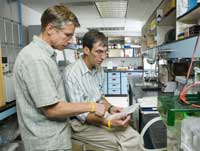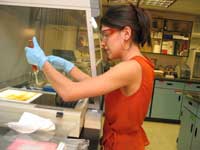The Research Angle: Proteomics May Be the Key to Successful Cardiac Surgery
 |
|
Ken Reardon and Chris Orton, professor of clinical sciences, collaborate on proteomics research to identify the proteins that cause transplanted heart valve tissue rejection.
|
Cardiovascular disease is the single leading cause of death in America and results in more than 16 million deaths worldwide. Heart valve replacement is an important treatment for people with heart disease; however, the ideal prosthetic heart valve has not yet been developed. Currently available prostheses include bioprostheses (artificial heart valves fashioned from animal tissues such as pig valves) that sometimes undergo immune rejection by the patient. One solution to the development of a better heart valve prosthesis would be a "living" tissue-engineered heart valve made from the combination of animal tissues and the patient's own cells. Improving currently available bioprostheses as well as the development of a living tissue-engineered heart valve depends on gaining a better understanding of the immune rejection process.
Ken Reardon, professor of chemical and biological engineering, has formed a new collaboration with Professor Chris Orton, head of the cardiac surgery team at the Veterinary Teaching Hospital, to understand why donor tissue is sometimes rejected. They are developing new methods for screening a large number of proteins for the critically important property of antigenicity, or the degree to which a substance induces an immune response, across species. To accomplish this, Reardon and Orton are using proteomics to look at all of the proteins in the tissues used for bioprosthetic heart valves.
 |
|
|
Proteomics is a new focus in the field of biotechnology that enables a system-wide analysis of proteins produced by cells. With proteomics, researchers can detect proteins that elicit an immune response, and subsequently identify the protein antigen, categorize the antigens into broad groups according to their origin, and then place them into smaller categories according to structure, type, physical and chemical properties.
By exposing separated proteins to naturally-occurring and acquired antibodies, Orton and Reardon will determine which proteins are responsible for the antigenicity of biomaterials, and this knowledge can be used to develop strategies to selectively remove those proteins. This study will provide important insights about the bioprostheses and about tissue transplantation in general.